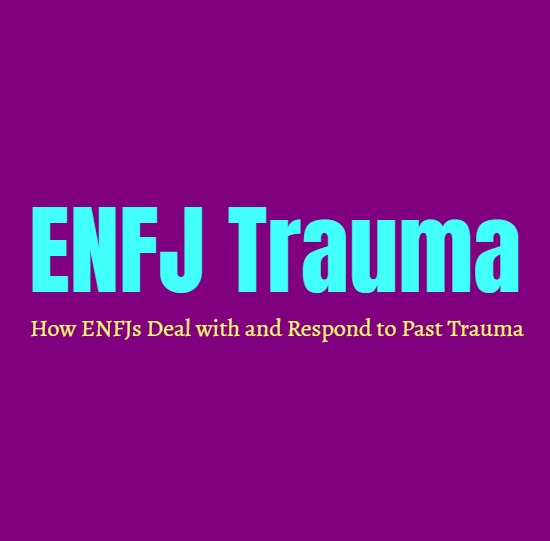ENFJ Trauma: How ENFJs Deal with and Respond to Past Trauma
When it comes to experiencing trauma, everyone has their own ways of handling and coping with what they go through. Of course, it often requires certain help from others, and serious trauma can also require therapy to find tools and ways to move through it. There are so many different types of trauma. Some happen so subtly that we don’t even realize we have endured a truly traumatic experience. It can be difficult to process, especially when you are still involved in the trauma which is bringing you down. This is something that can affect someone’s behavior long-term and make certain personality types behave in ways that don’t seem to really fit who they normally are. This is why it is important to understand the different ways that trauma can change someone or alter their behavior.
Trauma can certainly affect the ENFJ immensely, especially if it is something they endured from a young age. They have a hard time processing their sense of guilt, even when the ENFJ is the victim in a situation. Always wanting to appear strong and in control for the sake of others can make it difficult for ENFJs to accept trauma or abuse from their past. They might respond by trying to bury those emotions and hope they can keep pushing forward without really handling their feelings. ENFJs just want to be everything to everyone, which makes it hard for them to take time for their own needs and self-reflection. Having to always feel strong for others makes it a challenge for the ENFJ when they experience some sort of trauma and really need to take time to deal with this.
ENFJ Childhood Trauma
The ENFJ who has endured some sort of trauma from childhood is likely to bottle things up even more. They might appear to be a bit on edge or anxious sometimes, constantly wanting to please everyone. They likely want to repress those feelings, especially if no one actively tries to console them. ENFJs don’t want to burden others, so dealing with childhood trauma can be difficult for them to unpack. It might have caused them to be a bit more withdrawn as children, which is unusual for the ENFJ, who is normally outgoing and charming. It can be something that causes others to misunderstand the ENFJ child, especially if they start to become distant. For some, it simply makes them even more eager to please others, wanting to appear perfect and prevent any future traumatic experiences from occurring. This is something that most people won’t recognize since ENFJs are naturally giving people who want to help others. This can kick that part of them into overdrive, though, causing them to obsessively strive to prevent any negativity in their environment. They become perfectionists over the smallest of things and can become truly anxious if it seems like something is not going according to plan.
How Trauma Changes The ENFJ
Enduring some sort of trauma often plagues the ENFJ with a sense of personal guilt. They easily blame themselves when things go wrong, but this can become amplified. The ENFJ might feel as if they are responsible for everyone around them, wanting to ensure that nothing goes wrong no matter what. They care about helping others and want to be the person that their loved ones come to for assistance and comfort. This is natural for the ENFJ, but when they have endured trauma, it can put even more pressure on them to ensure that everyone is happy. This doesn’t always come out in the most positive and lighthearted ways either, as the ENFJ who has been through serious trauma might find it easier to snap on people. If they are dealing with juggling so many things at once and find that it becomes easy to become short-tempered with anyone who is in their way or not helping somehow. The ENFJ who has dealt with serious trauma can also be more prone to times when they become a bit reckless and seek out momentary pleasures to make themselves feel better.
ENFJ Coping with Trauma
For the ENFJ personality coping with trauma can be a long and sometimes challenging process. They are so focused on tending to the needs of others that they can actually use this as a crutch. Instead of dealing with their own problems and trauma, the ENFJ finds ways to help others and often overwhelms themselves with tasks. For them, it comes more naturally to bury their feelings and try to remain strong and focused on their goals. They do often neglect their own needs in favor of helping others, and this is something that likely becomes worse with certain trauma. Instead of dealing with their past, the ENFJ will want to find ways to help others and avoid being a burden. For them, the idea of burdening others with their own problems often feels very selfish, and ENFJs don’t like seeing themselves as selfish. Instead of taking time to process those emotions or past experiences, they try to ignore them and overcome them this way. Of course, this is not the healthiest of responses and won’t truly lead to the ENFJ dealing with their trauma so that they can move on. Seeking out professional help is a truly important step, as well as seeking help from loved ones. The ENFJ will feel so much better once they can connect with people over their experiences, especially if they can find people who have been through something similar. Sharing this and knowing that they aren’t alone is something that the ENFJ values very much. They are naturally social people, so going through this process alone is often less rewarding than having others to share it with. Even sharing their own trauma in order to help others through something similar will actually give the ENFJ a sense of drive and purpose.
This Post is Brought To You By BetterHelp
